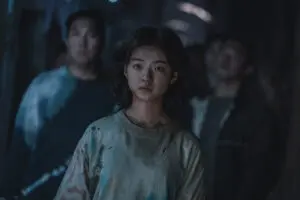Summary
A more ambitious but ultimately flawed follow-up, Sweet Home Season 2 is at once both too long and too rushed and too familiar and too new. But it’s still a rollicking good time if you’re willing to overlook some issues.
It has been three years since we last saw Sweet Home, the Netflix adaptation of the popular Naver webtoon of the same name. And a lot has changed since then. The main thing is that Squid Game came out, redefining the appeal and accessibility of Korean drama for mainstream international audiences. Given how popular Season 1 was despite this, it’s hard to imagine the heights that may be reached now that Season 2 is here.
Of course, it’s cliché to compare every K-Drama to Squid Game, and pointless in a way since it’s unlikely any other show – including its own reality spin-off Squid Game: The Challenge, and its sequel, which is in production despite never having been intended – will recapture the same lightning-in-a-bottle popularity. But it’s undeniable that the streaming landscape is different now than it was before, more amendable to certain kinds of shows and storytelling, and Sweet Home Season 2 does seem to have changed to accommodate that.
Sweet Home Season 2 review and plot summary
Case in point: What was previously a rather claustrophobic thriller set primarily in one apartment complex and concerning a relatively small clutch of characters is now an expansive dystopian epic. Perspective shifts between two groups – protagonist Cha Hyun-su on one hand and the other Green Home survivors on the other – as they try to navigate a world ravaged by monsters, gripped tightly by psychotic military quarantining, and becoming a playground for unscrupulous mad scientists.
Early on in the Season 2 premiere, which kicks off where the Season 1 finale left off, it’s obvious that the new focus of this season is not just the continuing theme of man’s general inhumanity but particularly how this callousness permeates systems of governance and protection. It’s even arguably a little heavy-handed how immediately villainized the military is here, torturing baby monsters to lure out their mothers, beating anyone with a nosebleed to death, and just generally acting like maniacs, as though the fear of being killed by or becoming a monster has not transformed them into their most unpleasant selves but simply given them an excuse to reveal what they were all along.
This can sometimes feel like Sweet Home trying to have its cake and eat it since it’s a little picky about which monsters it wants to engender sympathy for and which are clearly intended to be vicious, dangerous horrors. The thematic throughline would have been more coherent if – and this is a far-out comparison, but stick with me – it had an approach more akin to something like the MonsterVerse, where everything is explicitly just a wild animal that is entirely unconcerned with everything other than their innate behaviors. Here, the monster designs are frequently reflections of a person’s position in life or the circumstances of their demise, and it’s too specific to support such a broad underlying point.
But let’s talk about the monsters. They… often don’t look great. Some uses of practical effects are striking and believably gooey and horrible, but it’s mostly CGI that lacks a physical presence in the scene. Often, it doesn’t even visually match the background. The stunt work and some wide shots of carnage look extremely expensive, too, so it’s odd how obviously bad some of the monsters are, especially when they’re the primary selling point of the series.
RELATED: What to expect from Sweet Home Season 3?
To be more specific and fair, though, one supposes the monsters’ circumstances provide the greatest appeal, especially the circumstances of their deaths and transformations, and Sweet Home Season 2, like the first outing, still nails this element. In fact it might nail it even more than before, with the more expansive storytelling roping in new characters and ideas and weaving them into almost mythic tales of neo-humans and governments and scientific meddling.
The emotional core remains, too. Hyun-su is arguably a less interesting protagonist now that he’s all-powerful, but he’s replaced as the audience POV largely by Yi-kyung, the only character who wasn’t in the webtoon and who gets an expanded, welcome role here.
But it’s a tough sit. By that, I don’t mean that the season is bad by any means, but it’s eight episodes, all of which run over an hour, and the first few set such a ridiculous breakneck pace that it’s impossible to sustain it throughout. New characters are introduced with little fanfare, old ones are unceremoniously killed off, and the spectacle threatens to overwhelm the drama until everything has the time and space to just slow down and take a breath. But when it does you really feel the burden of having almost feature-length episodes. There’s no middle ground here – it’s either balls-to-the-wall action and deaths and twists and carnage, or it’s too slow for its own good.
Was Sweet Home Season 2 worth the wait?
Despite these quibbles and being largely unsuited to a binge watch because of them, Sweet Home Season 2 is nonetheless an impressive and entertaining ride. It’s not as good as the first season, feeling as hampered by its expanded focus as it is improved by it, but it delivers an extraordinary amount of action, nastiness, and thrills in a very reliable way.
Whether this season was worth the long wait is arguable. Many fans will love it, but just as many will be frustrated by it and might ultimately end up fatigued with it. There’s just a lot here, and it’s all competing for a limited amount of space. Many of the fan-favourites from the first season are done away with in rushed and unsatisfying ways to be replaced by newer characters we’re expected to care for in the same way, and it isn’t until the back half of the season when everything really coalesces. While most viewers will get that far, carried along by the unstoppable momentum of the early episodes, a few will probably drop off out of sheer disorientation.
Still, there’s always room for balls-to-the-wall television that takes big swings and is willing to go all-out to be entertaining, even sometimes in spite of itself. Imperfect it may be, but Sweet Home is also daringly demented in a way that most stuff isn’t, and we should probably value that quality more than anything else.




